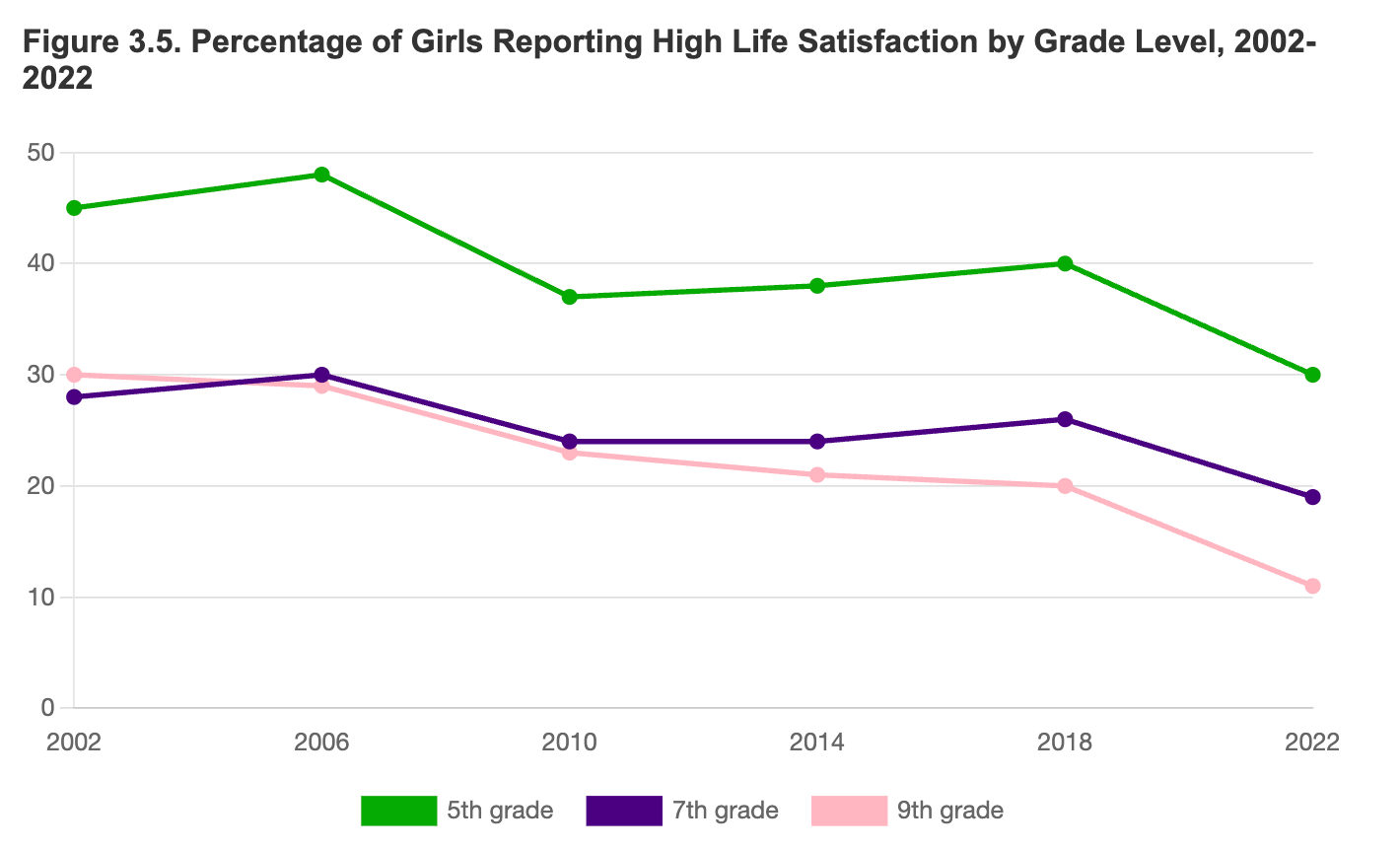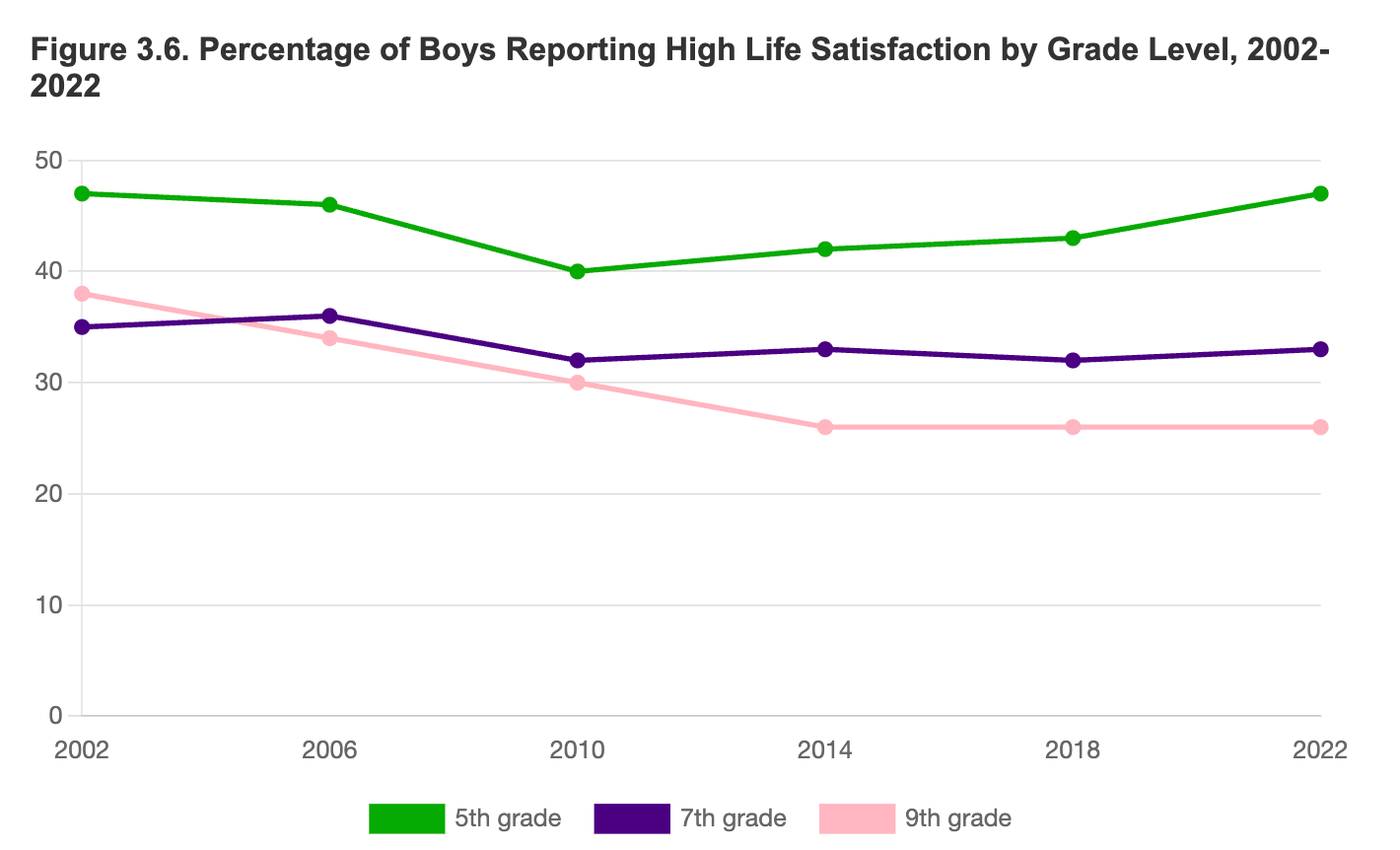The report reshaping Danish education: What parents need to know
In this issue: key findings from Denmark's Well-being Commission; girls are struggling more than boys; France, Spain, Greece and Denmark are aiming for a youth social media ban
The Danish Well-being Commission’s recommendations
This week we’ll do a deep dive into the recommendations of the Danish Well-being Commission, published February 2025. The report is substantial at more than 140 pages so I'm just going to focus on the key data and recommendations.
Keep reading and you’ll find this lovely quote from the authors:
Remember that you know your child best, perfect parenting doesn't exist, and love, presence, and care matter most.
The report has had a strong impact on Danish policymakers, with the most publicized one being the ban on phones in schools. But that’s a very small slice of what the commission found and recommended, so let’s spend some more time on the report, as it will impact how our kids grow and thrive over many years to come.
The goal of the Well-being Commission was to assess the wellbeing challenges of Danish youth and make recommendations on how to address the challenges. "The vast majority of children and young people in Denmark thrive", the report authors say. There isn’t a wellbeing crisis, but there are issues that need to be addressed.

The commission claims that the trends experienced in Denmark are part of a Western pattern, “linked to culture, technology, liberation, secularization, loss of meaning, and a new view of childhood, among other things".
Girls are doing worse than boys
A significant gender dimension is seen in the well-being challenges, which is in line with similar studies. "The figures indicate that many of the older girls struggle with a sense of wrongness. Over half of the girls in 9th grade have low self-esteem and approximately one in four girls in grades 4-9 have low self-confidence. In general, boys seem to thrive better than girls. But if you look at behavioral indicators such as physical interaction with friends and social isolation, the figures show that boys are less physically with their friends, and that more young men show signs of social isolation."
The Well-being Commission made a total of 35 recommendations organized across 8 themes. I will only be focusing on the key insights and recommendations.
1. We need to talk differently about wellbeing.
"Lack of wellbeing and mental illness are often understood as one and the same. This serves no one. Least of all the children and young people who struggle with their self-perception. The commission assesses that there is a need to talk about wellbeing in a new and more nuanced way, where common human discomfort is understood as a part of life, and where wellbeing is about being able to handle the challenges that life also brings."
2. A balanced digital life
The commission finds that there is a need for stronger protection of children and young people when they use digital services, and that a precautionary principle must be applied when it comes to children and young people in digital environments.
"To achieve both better protection for children and young people online and a better balance between their analogue and digital lives, it is essential that tech giants and their services are regulated to an even greater extent, so the risk of children and young people encountering addictive design and non-age-appropriate content online is minimised. As long as this is not the case, for the sake of the wellbeing of children and young people, it is necessary to limit the role that digital devices play in their lives."
The commission recommends the following:
Pressure on the EU for stricter regulation and enforcement of digital services. Denmark should pressure the EU to ban addictive design, require age verification, and prohibit advertising to under-18s on digital platforms.
Postpone children's smartphone debut until they are 13 years old. Children should not receive smartphones or personal tablets until age 13 to protect time for play, physical activities, and face-to-face relationships.
Adults as digital role models. Adults should model good digital behavior, make collective parental agreements about children's technology use, and create screen-free family time.
Smartphone-free primary schools and upper secondary education. All primary schools should be legally required to ban smartphones (including in after-school programs), while upper secondary schools must develop screen policies with student input.
Firewalls in all primary schools, at 'efterskoler', FGU and upper secondary education institutions. All schools should install firewalls blocking social media, games, shopping, and other non-educational sites on school networks.
Stop livestreaming of children's and young people's sports activities. Sports clubs should stop livestreaming youth activities to preserve leisure time as a performance-free sanctuary focused on fun and togetherness.
3. Character formation and empowerment
Strengthening children's and young people's character formation - understood as qualities such as self-regulation, perseverance, belief in one's own abilities, and a sense of responsibility - is a crucial element in promoting wellbeing.
The recommendations call for incorporating character development into daycare and school curricula, democratizing access to 'efterskole' and 'højskole' by reducing financial and cultural barriers, encouraging more young people to take part-time jobs and volunteer work to develop responsibility and social skills, and expanding access to arts and cultural activities.
These initiatives aim to provide young people with non-academic experiences that build personal qualities like perseverance, self-regulation, responsibility, and community engagement, while offering alternatives to the diagnostic language often used to understand youth challenges.
4. A contemporary pedagogical practice
Key recommendations include improving mainstream education with better resources (like two-teacher systems) so fewer children need special education services, reforming the grading scale to focus less on deficiencies and reduce performance pressure, and adjusting exam pressure in primary schools to allow more time for community-building, nature activities, and physical movement.
For parents, this means their children would experience less academic pressure, develop stronger character and coping skills, have better support in regular classrooms, and face assessment systems that recognize growth rather than just highlighting shortcomings.
5. Communities through leisure activities
The Well-being Commission recommends children should participate in meaningful leisure activities with others (sports, arts, music, etc.) as these provide crucial communities that support wellbeing, develop social skills, and offer safe spaces away from performance pressure.
Parents should actively ensure their children engage in such activities, and for families facing financial barriers, municipalities should offer leisure pass schemes covering membership fees and equipment.
For parents of teenagers, key recommendations include making collective agreements with other parents about alcohol consumption and tobacco/nicotine use (no later than 7th grade), being good role models regarding substance use, and supporting schools in creating alcohol-free social events and study starts.
The overall message is that structured leisure activities serve as protective factors for children's wellbeing by offering meaningful connections outside of academic settings.
6. Body and movement
Regular physical activity and movement are crucial protective factors for children's wellbeing, helping prevent anxiety and depression while building self-esteem and healthy body image - particularly important as a counterbalance to the idealized bodies children see on social media.
Parents should actively create space for both organized sports and self-organized play in their children's daily lives, recognizing that joy in movement developed early creates lifelong healthy habits.
The recommendations acknowledge concerning trends like youth dropping out of organized sports and social inequalities in physical activity participation, urging parents to help children maintain connections to sports and movement activities as they grow older.
To promote healthy body image, parents should help children understand that bodies naturally come in different shapes and sizes, while supporting initiatives like smartphone-free changing rooms in schools and sports facilities to create safe spaces where children feel comfortable with their bodies.
7. Early and timely action
Early intervention is crucial for preventing minor wellbeing issues from becoming serious problems, with warning signs including conflict-ridden divorces, increasing school absenteeism, bullying (including digital), and other stressful life events.
Parents should know that multiple support systems exist: health visiting services for ages 0-1, preventive health examinations for ages 0-6, and since July 2024, free easily accessible municipal treatment services that parents can contact directly without referrals for children showing signs of psychological distress.
Additionally, services run by civil society organizations offer free counseling, support groups, and community activities without requiring formal referrals - though awareness of these services needs improvement, especially outside major cities and among vulnerable groups like LGBT+ youth.
8. Principles for modern parenting
The commission recognizes that while parents' concern for their children's wellbeing is positive, overprotective, over-monitoring, and negotiating parenting styles can paradoxically harm children's wellbeing. The commission proposes seven principles for modern parenting:
1. Set age-appropriate, loving demands with clear frameworks;
2. Limit monitoring and trust children's capabilities;
3. Have faith in their ability to handle challenges independently;
4. Involve and listen to them appropriately without sacrificing boundaries;
5. Teach responsibility for others and communities;
6. Focus on developing self-regulation, perseverance, and resilience while normalizing temporary sadness;
7. Remember that you know your child best, perfect parenting doesn't exist, and love, presence, and care matter most.
Don’t skip this survey
We created a short survey to understand your challenges and get more insights about your availability to contribute to our initiative — after reviewing your answers, we're planning a face-to-face meetup.
Check this out: things worth your attention
🗞️EXCLUSIVE: Copenhagen eyes social media ban for children over ‘data harvesting’ fears
Denmark will consider banning social media for kids under 15 years old, Danish Digital Minister Caroline Stage Olsen told Euractiv in an exclusive interview. "Social media has not lived up to its responsibilities," Olsen also told us. "Today it has nothing to do with interacting with each other, [but] solely something to do with data harvesting and earning money [from] advertisement."
🗞️ EU countries push for stricter rules to keep children off social media
Backed by France and Spain, Greece has spearheaded a proposal for how the EU should limit children's use of online platforms as fears mount over their addictive nature. They will present the plan on Friday to EU counterparts in Luxembourg "so that Europe can take the appropriate action as soon as possible", Greek Digital Minister Dimitris Papastergiou said.
🗞️Study: parents’ preoccupation with devices leads to frustrations and feelings of neglect in children aged 6–9 years
This study highlights children’s awareness of how devices disrupt parent-child interactions. The findings reveal that children are keenly aware of the patterns and purposes of their parents’ device use throughout the day, often observing the high level of absorption and preoccupation parents exhibit when on their devices. Children expressed feelings of neglect and frustration due to their parents’ divided attention.
🗞️ Study: screen time and emotional problems in kids: A vicious circle?
A landmark study involving more than 292,000 children has confirmed a two-way link between screen time and socioemotional challenges in children. Those who spend more time on screens are more likely to develop emotional and behavioural issues – and those with these issues are, in turn, more likely to increase their screen use as a coping mechanism.
One thing to try this week
Make a "collective parental agreement" with other parents in your child's class or friend group. The Well-being Commission specifically recommends parents work together on shared rules about technology use. Reach out to other parents and suggest creating a simple agreement about smartphone age limits or screen-free playdates. When parents unite on this, it removes the "but everyone else has one!" pressure and makes it easier for all families to stick to healthier tech boundaries.
I want to hear from you
What questions about kids and technology keep you up at night? Would you like to contribute to a future newsletter? Add a comment or send me an email at svoinea@gmail.com.
This newsletter will evolve based on what matters to you. Reach out with your thoughts and questions, and if you know other parents who might find this helpful please send them the newsletter.





